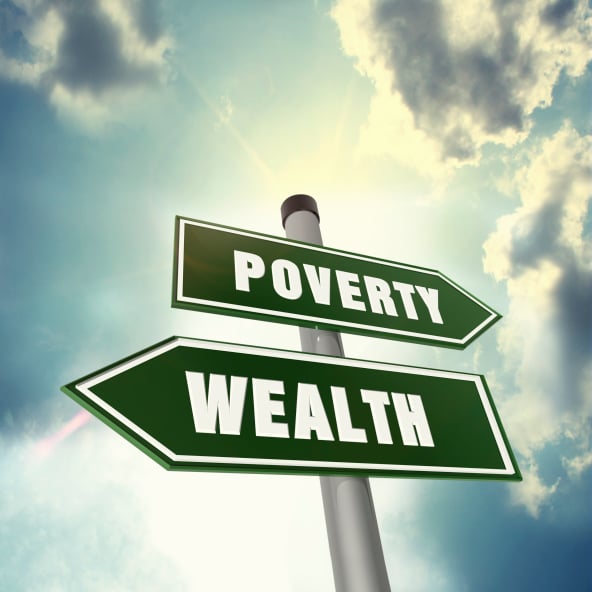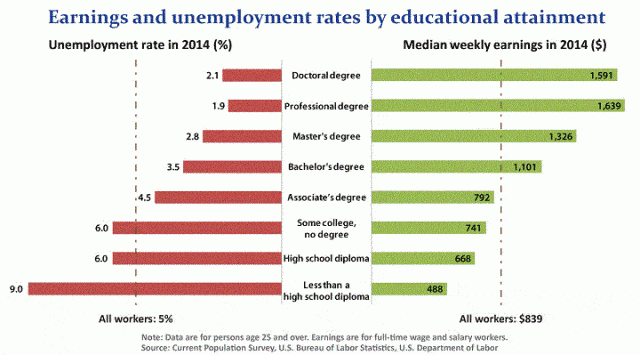Education Isn’t the Solution to Income Inequality

0 Your Reaction?
Source: iStock
“[H]igher education may be the surest path to the middle class,” President Obama declared in a 2013 speech on economic mobility. That belief in the power of education lies behind the current administration’s recent efforts to make community college free for students, increase Pell Grants for the neediest students, and keep student loan interest rates low.
Yet those attempts to get more people enrolled in college, while laudable, aren’t going to be enough to eliminate income inequality, say an increasing number of economists. While no one is arguing that people who finish high school and go on to college generally reap big financial rewards, simply making it easier for more Americans to pursue higher education likely won’t do much to close the huge gap between the richest and poorest people in the United States.
“[E]ducation is an immensely worthwhile investment,” said economist Larry Summers in an interview with The Washington Post in March 2015. “That said, the main way in which strengthening education is desirable is that it will raise productivity and raise overall incomes in our society. It is not likely, in my view, that any feasible program of improving education will have a large impact on inequality in any relevant horizon.”
Other experts on inequality agree. “Even if increasing educational attainment reduced inequality of opportunity between the disadvantaged and the middle class — and reduced wage differentials within the middle class — this does not imply an acceleration of the rate of average income growth of the bottom 99%,” wrote economist Lars Osberg on Inequality.org.

0 Your Reaction?
Source: Thinkstock
The real solution to income equality in the U.S., Summers suggests, is a system of more progressive taxation so that the rich benefit less from generous tax loopholes and the poor pay fewer taxes.
Summers, along with fellow economists Brad Hershbein and Melissa Kearney, conducted an experiment to see what might happen if 10% of men between the ages of 25 and 64 who hadn’t been to college suddenly had a degree. They concluded that having a degree meant greater earnings potential and higher incomes for individuals. Median earnings would jump by more than $3,000 per year, according to their calculations, which were published on the Brookings Institution blog.
Giving more people a college education would also reduce inequality among the bottom 50% of earners. But it would have little impact at the top. “Increasing educational attainment will not significantly change overall earnings inequality,” Summers and his colleagues wrote.
In the past, many people have assumed that better-educated workers would be able to command higher wages, because there were more jobs requiring an education than workers to fill them. The theory was that “increasing the supply of educated workers should reduce inequality as it would increase wages among a broader supply of more educated workers,” wrote Nick Bunker, a policy analyst with the Washington Center for Equitable Growth, on the think tank’s blog. “But that assumes the demand for educated workers will continue to rise. Problem is, recent research finds that the demand for skilled labor appears to be on the decline.”

0 Your Reaction?
Source: Thinkstock
If it’s true that demand for educated workers is actually falling (Bunker points to research from the National Bureau of Economic Research to support his point), then educating more workers means that the “wage premium” that comes with having an education will shrink.
Nobel-Prize-winning economist Paul Krugman made a similar point in a New York Times op-ed. “The notion that highly skilled workers are generally in demand is just false,” he wrote. “Rising inequality isn’t about who has the knowledge; it’s about who has the power.”
Education is still vital to improving the day-to-day lives of lower-income workers. Better-educated workers enjoy lower unemployment rates and higher overall earnings on average when compared to those with less education. In 2014, the unemployment rate among workers with a bachelor’s degree was 3.5%, according to the Bureau of Labor Statistics, while 6% of those with just a high school diploma were not working. People with four-year degrees also took home an average of $433 more per week than those who did not have education beyond the 12th grade.

0 Your Reaction?
Source: Bureau of Labor Statistics
Those figures mask a troubling truth, however. While college-educated workers tend to do better economically than those without a degree, their wages have not been growing in recent years. Real wages among young college graduates are actually lower today than they were in 2000, according to the Economic Policy Institute (EPI). For the bottom 90% of workers, real wages have increased just 15% since 1980, compared to a 138% increase for those in the top 1%.

0 Your Reaction?
Source: Thinkstock
Huge increases in CEO compensation without equivalent increases in pay for those at the bottom are behind this income gap, say EPI economists. The average annual income for a middle-class household would be
Read more: http://www.cheatsheet.com/personal-finance/education-isnt-the-solution-to-income-inequality.html/?a=viewall#ixzz3X16UsLdS
